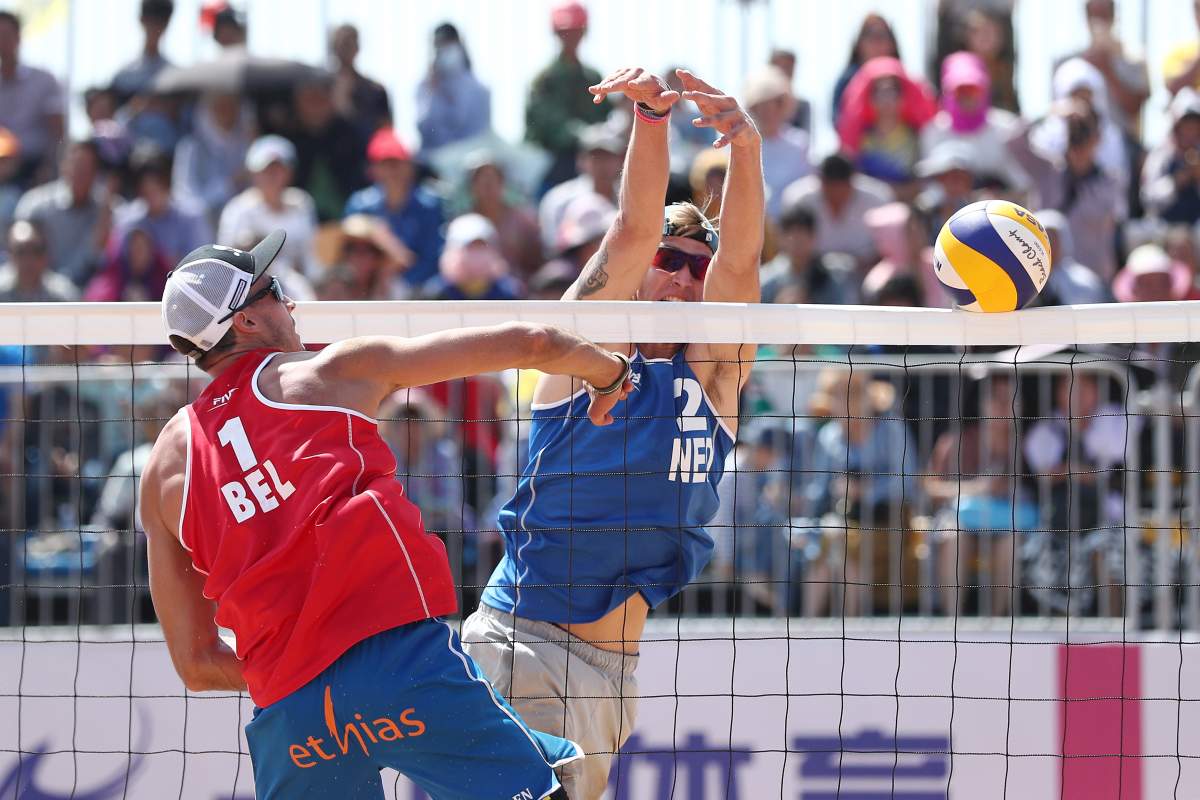NOTE: The following article contains content that some might find disturbing. Please read at your own discretion.

A beach volleyball player and convicted child rapist from the Netherlands is stirring outrage for his controversial inclusion on the Dutch Olympics team, sparking petitions and calls for the International Olympics Committee (IOC) to investigate why he is being allowed to compete.
Steven van de Velde, 29, will be competing with his partner Matthew Immers at the 2024 Paris Olympics, one of two men’s teams from the Netherlands that qualified for the Olympics beach volleyball event. Except, unlike most Olympic athletes, Van de Velde has a dark criminal background.
Steven van de Velde’s case, explained
Van de Velde was sentenced to four years in prison in 2016 after he admitted to raping a 12-year-old British girl when he was 19. He had met the girl on social media and they chatted online for several months. He told a U.K. court that he was aware of her age when he flew from Amsterdam to London in 2014 to meet the minor.
He raped the girl several times at her home while her mother was out. Van de Velde was caught after he advised the girl to get a morning-after pill. Staff at the family planning clinic were concerned about the girl’s young age and alerted her family and the police, the Athletic reports.
Van de Velde pleaded guilty to three counts of rape. The court heard at his sentencing how his victim felt so wracked with guilt following his arrest that she had begun self-harming.
“The emotional harm that has been caused to this child is enormous,” Judge Francis Sheridan said at the time. “As she matures, she will have to come to realize that you are not the nice man she thought you were and hoped you might be.”
Van de Velde served a year in prison in the U.K. before being extradited to the Netherlands and resentenced according to Dutch law. He served one more month in a Dutch prison before being released in early 2017.
Despite his lawyers lamenting at trial that Van de Velde’s then-burgeoning athletic career was over, the beach volleyball player almost immediately jumped back into competing for the Netherlands the same year he was released from prison.
Why is he competing?

Get breaking National news
The Netherlands Volleyball Federation has been defending its athlete publicly since Van de Velde qualified for the Olympics.
“After his release, Van de Velde sought and received professional counselling. He has demonstrated to those around him — privately and professionally — self-insight and reflection,” the federation said.
It added that both the federation and the Netherlands Olympic Committee “rely on the opinions of experts who consider the chance of recidivism nil.”
The Dutch Olympic committee said Van de Velde met the conditions required to return after a conviction and resumed his career in 2017 “after an intensive professionally supervised process.”
“Van de Velde now meets all the qualification requirements for the Olympic Games and is therefore part of the team,” the committee said.
In a statement posted to the Netherlands Volleyball Federation’s website, Van de Velde wrote that his crimes have “been the biggest mistake of my life.”
“I understand that in the run-up to the biggest sporting event in the world, this can attract the attention of international media,” he wrote. “I cannot reverse it, so I will have to bear the consequences.”
Van de Velde has been barred from talking to the media during the Olympics and the Dutch team have chosen to move him to alternative accommodation in Paris so he will not reside in the athletes’ village. The youngest Olympic athlete at the 2024 Games is just 11 years old.
The IOC does not play a role in selecting Olympic athletes or setting regulations for who can participate. The international volleyball federation said it “recognizes that this is a highly sensitive matter” but said team selection is the responsibility of the national Olympic committee “while respecting the eligibility criteria.”
International reactions
In a Monday press conference, Australian Olympic team chief Anna Meares stated that Australia would not have picked a convicted rapist to represent the country at the Olympics.
“If an athlete or staff member had that conviction they would not be allowed to be a member of our team,” she said. “We have stringent policies on safeguarding within our team.”
Meares pointed out that Team Australia has a number of young athletes under the ages of 16 and 18, and that these policies are meant to protect them.
Ciara Bergman, the CEO of Rape Crisis England & Wales, said it was “irresponsible” to allow someone like Van de Velde to compete at the Olympics.
“If you can rape a child and still compete in the Olympics, despite all athletes signing a declaration promising to be a role model, that is just shocking,” she wrote.
Bergman is calling on the IOC to investigate how Van de Velde was allowed to be selected for the Dutch Olympics team: “How did we get here? How did we get to a place where raping a child is seen as less important than the medal someone might win at the Olympics? It’s just extraordinary.”
An online petition started last month seeks to disqualify Van de Velde from the Paris 2024 Games. It has so far garnered more than 83,000 signatures, as of Thursday afternoon.
“The tarnished record of Van De Velde should not be swept under the rug,” reads a statement from the petition’s organizer Lauren Muir. “This is about more than just one person; it’s about the worldwide image of the Olympics and the kind of society we want to live in.”
If you or someone you know is experiencing abuse or is involved in an abusive situation, please visit the Canadian Resource Centre for Victims of Crime for help. They are also reachable toll-free at 1-877-232-2610.
— With files from The Associated Press















Comments